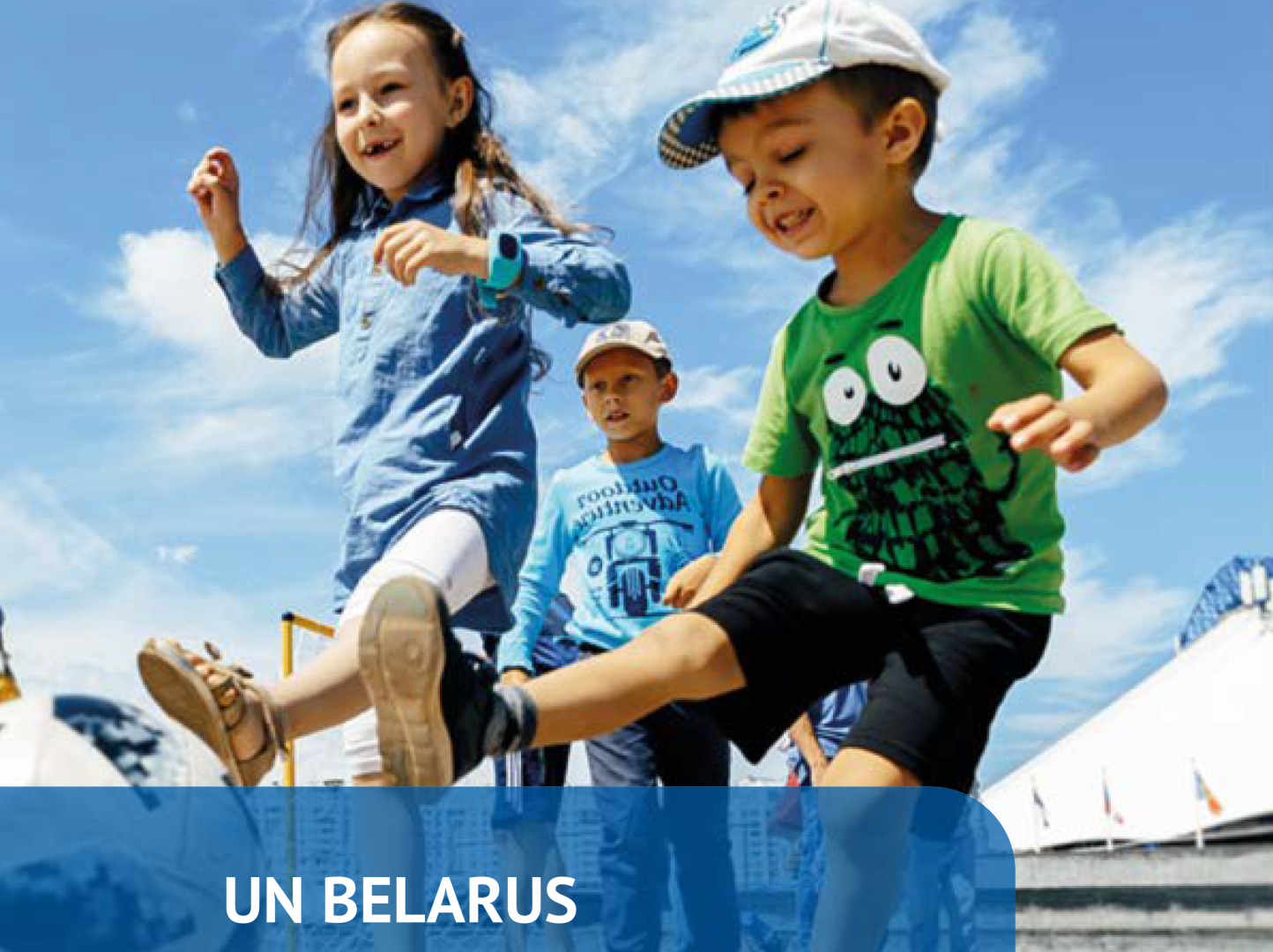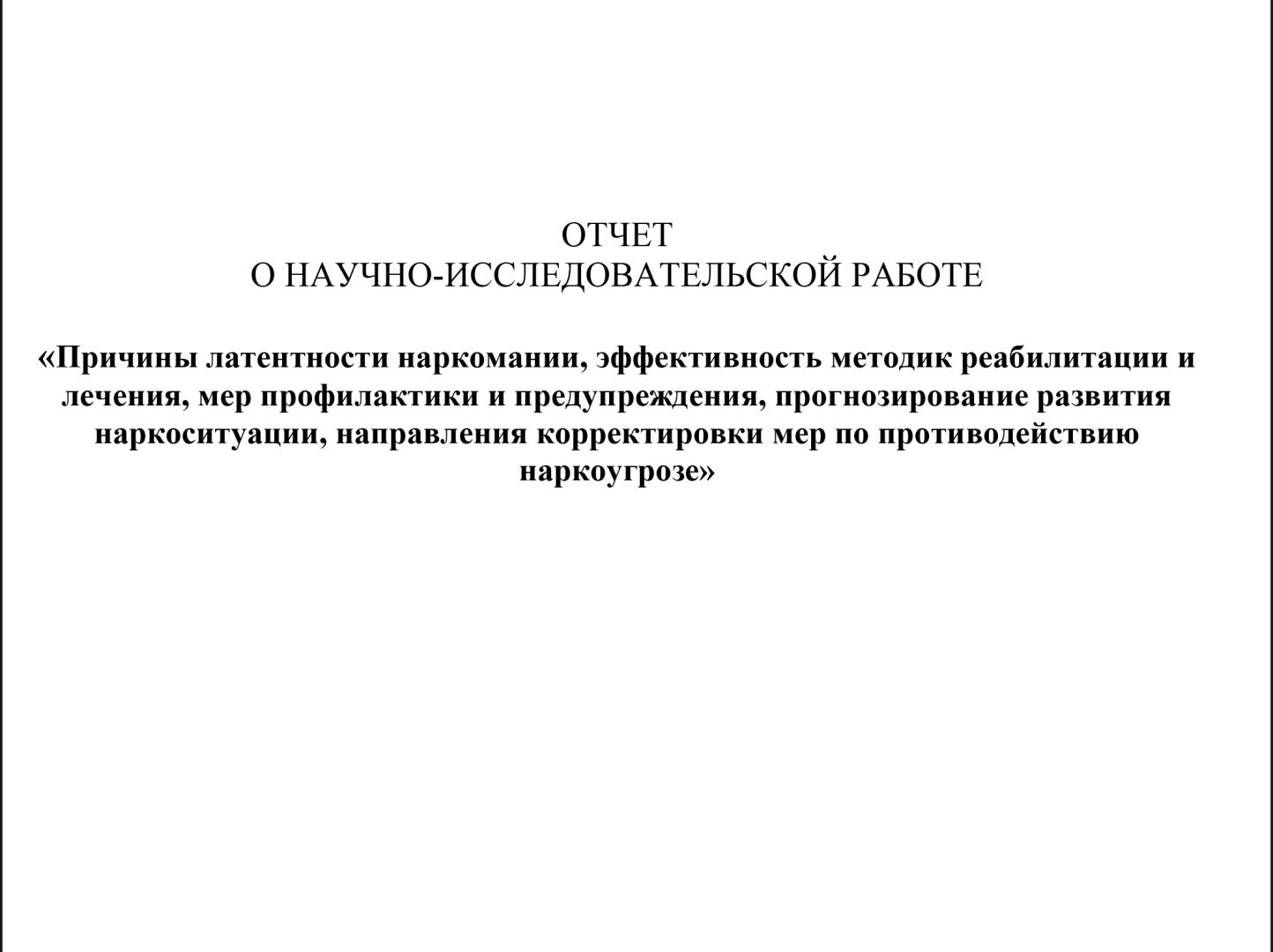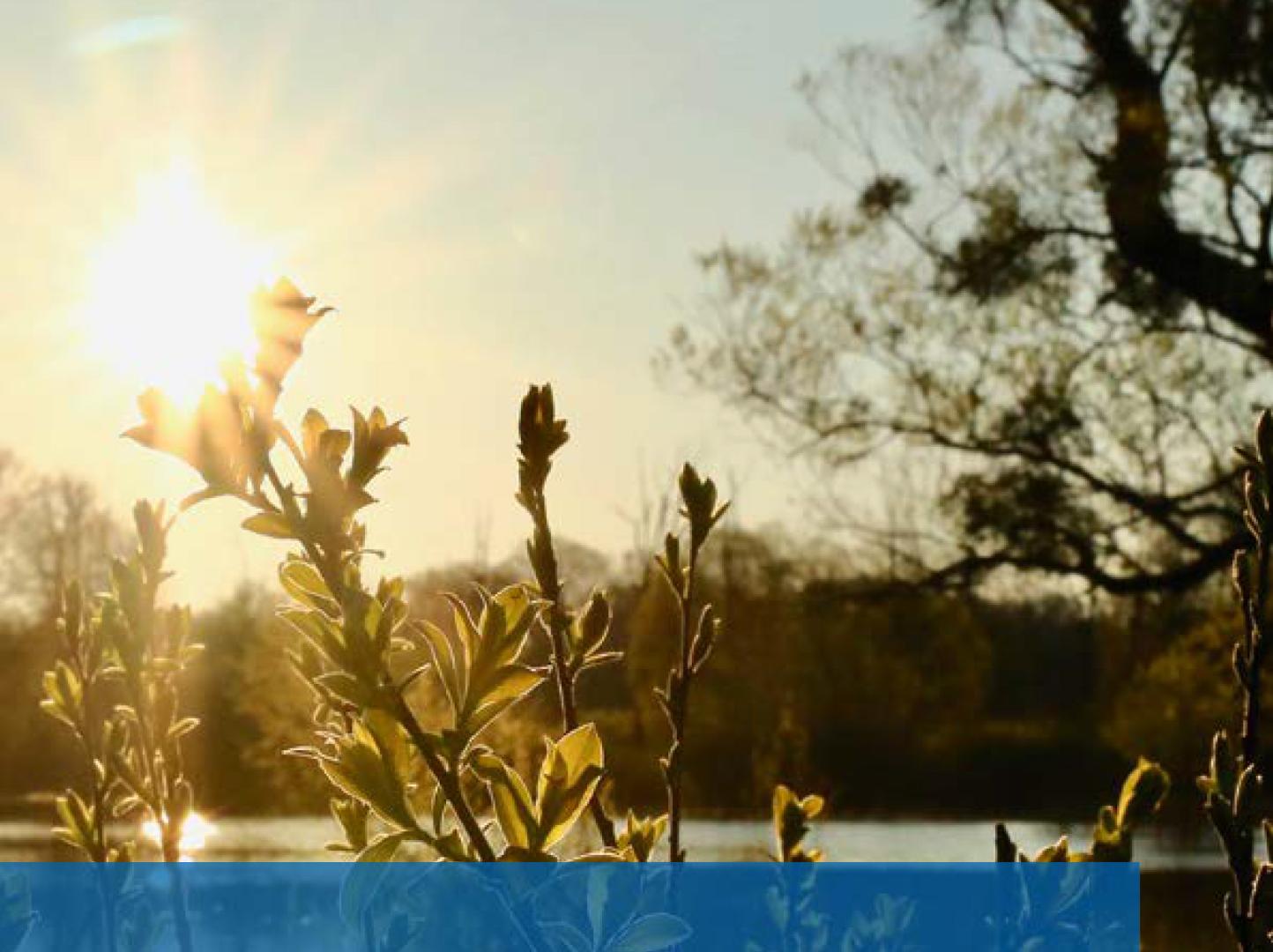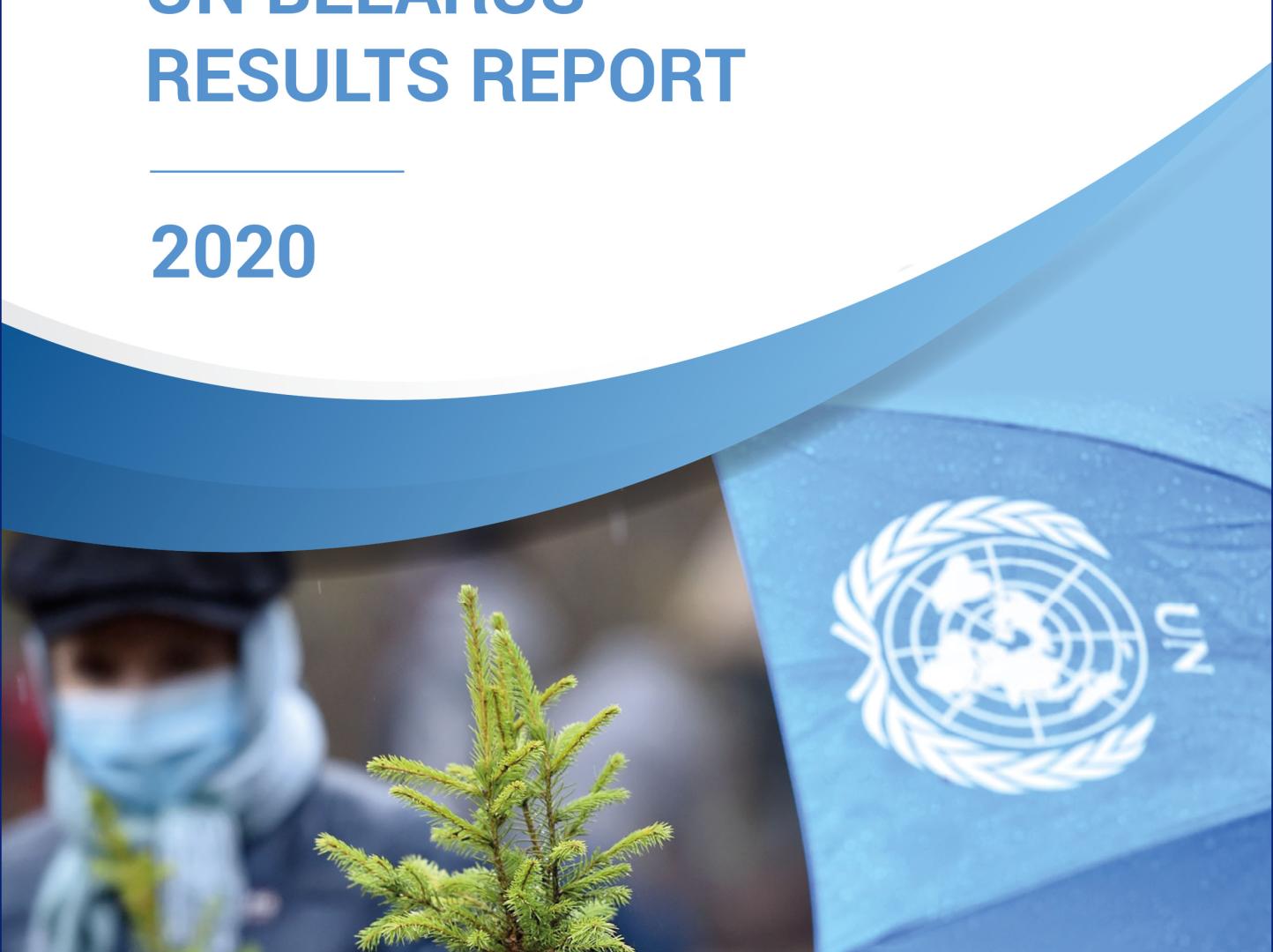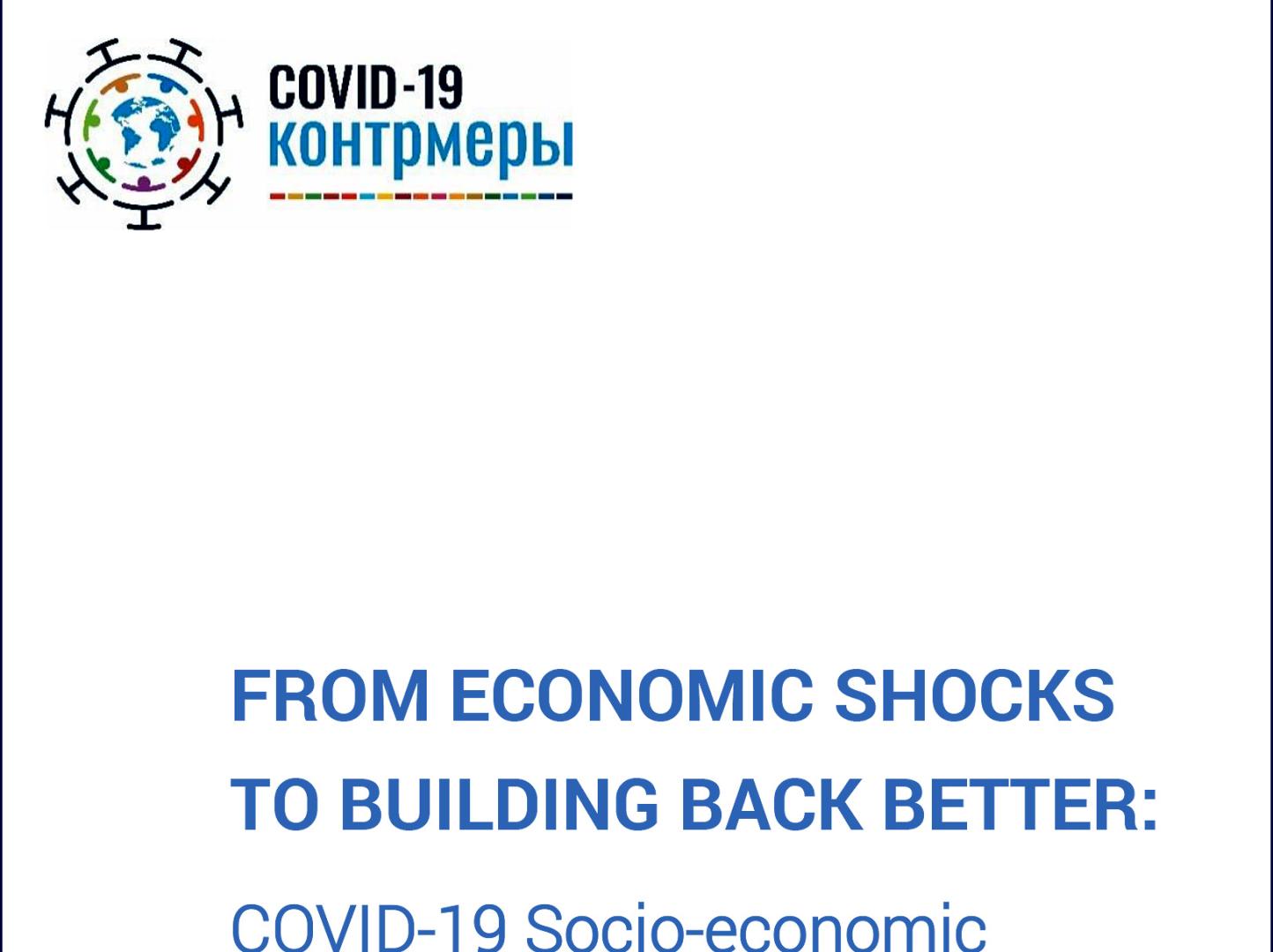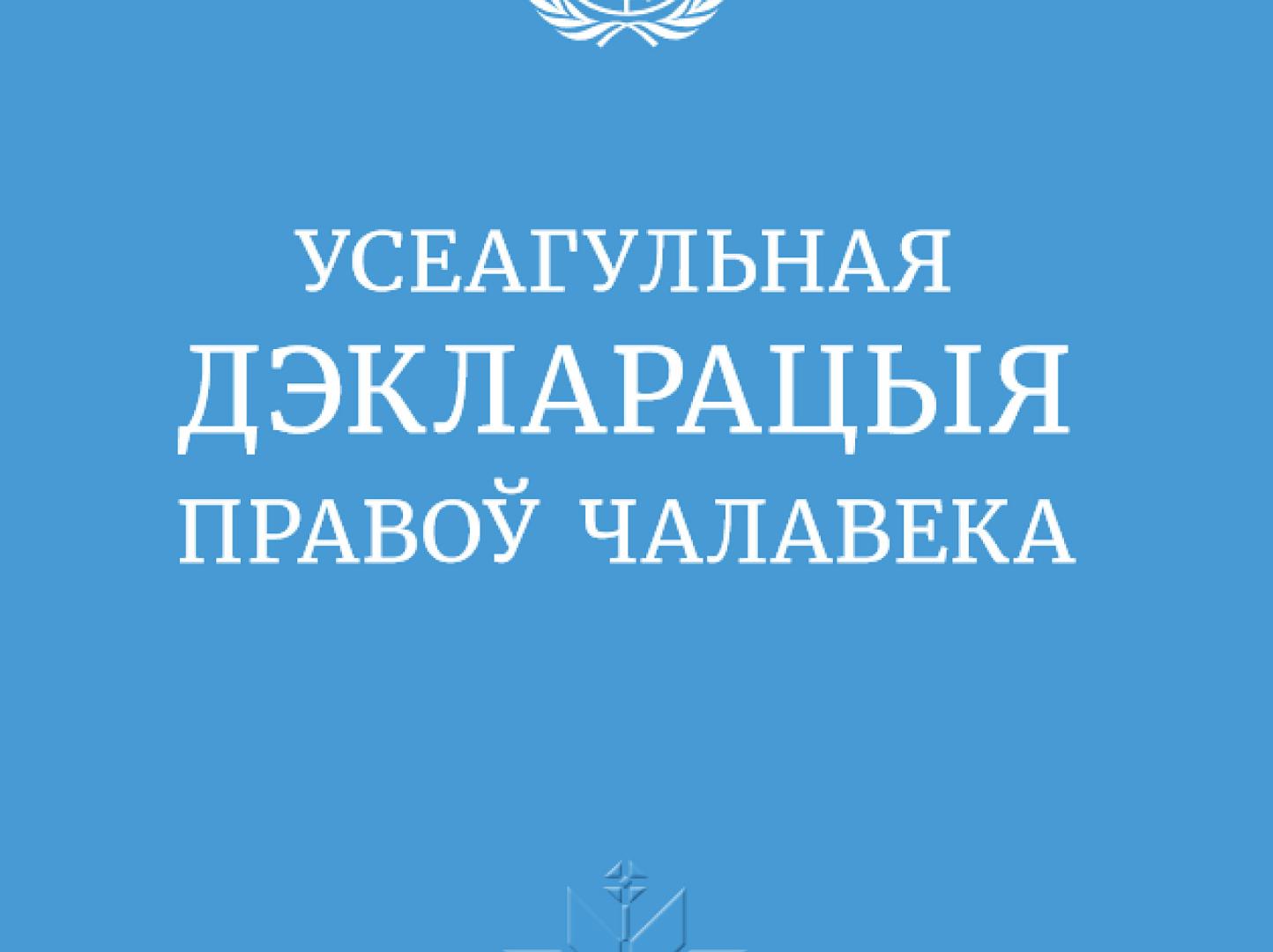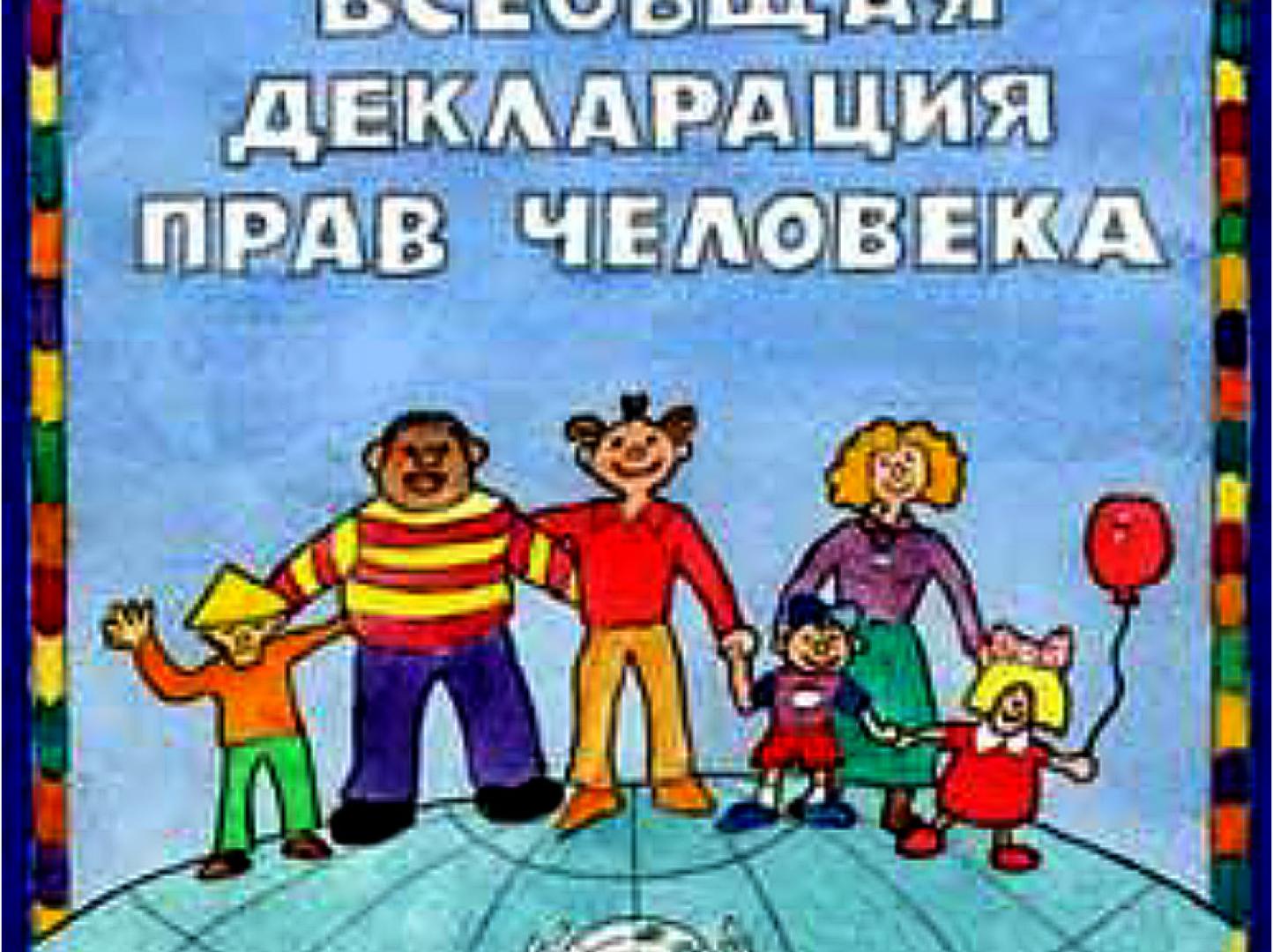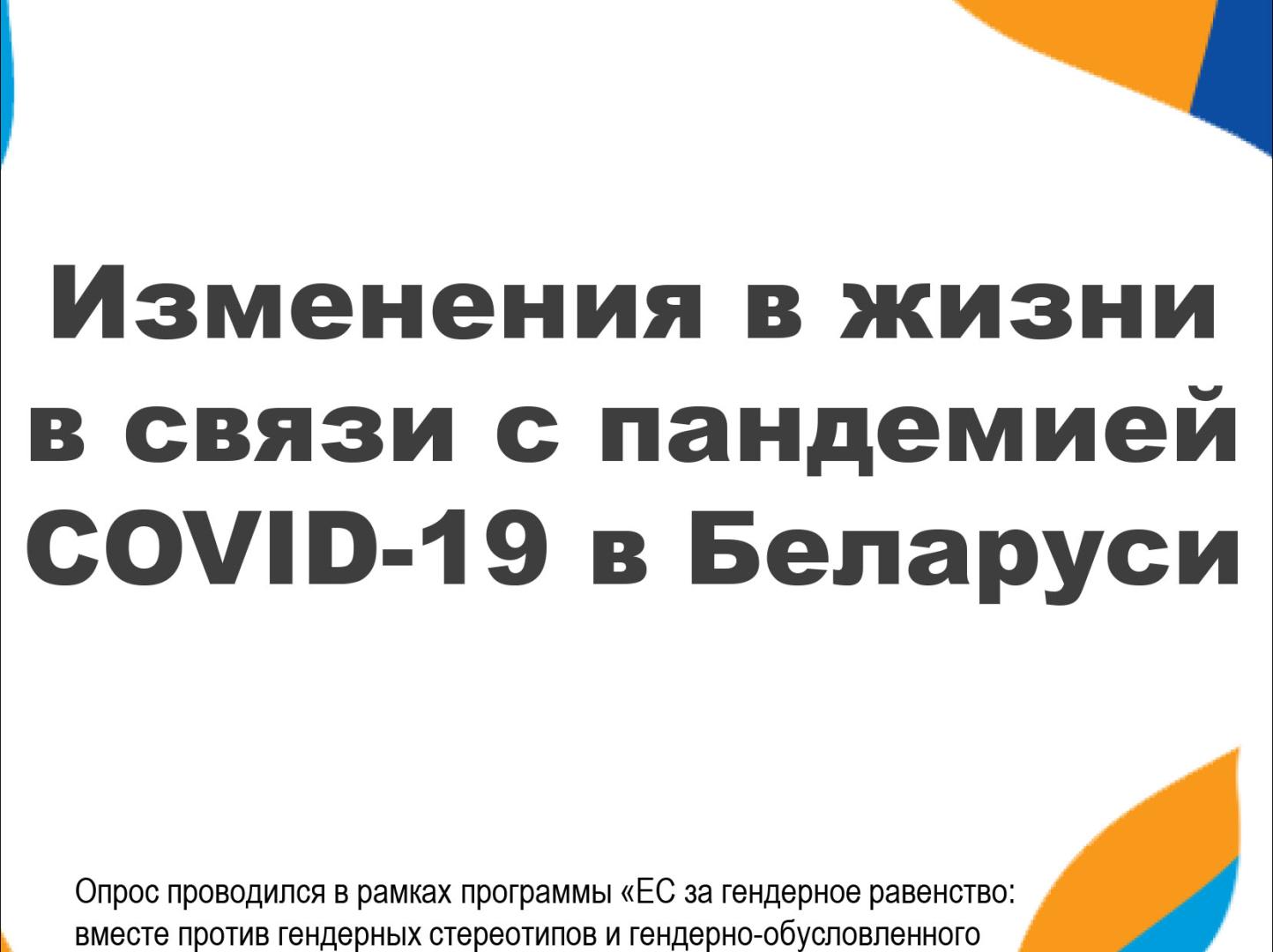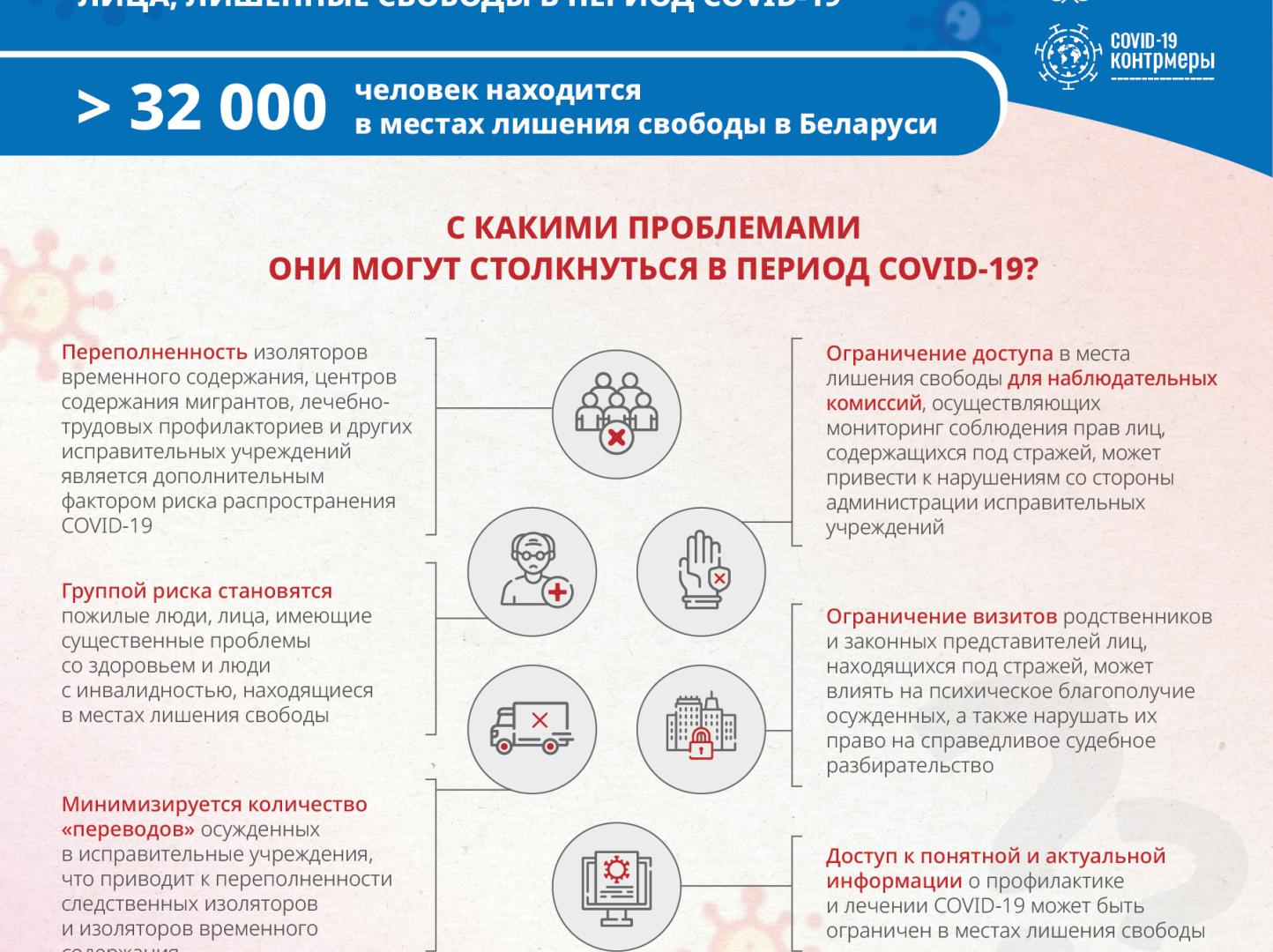Latest
Story
22 July 2025
Accelerating the Transition to Clean Energy: A Global Call and Dialogue with Business in Belarus
Learn more
Story
08 December 2024
Responsible Business Forum: Dialogue on the Future of Sustainable Development
Learn more
Story
09 September 2024
"World Café" in Minsk Unites Generations to Achieve the Sustainable Development Goals
Learn more
Latest
The Sustainable Development Goals in Belarus
The Sustainable Development Goals are a global call to action to end poverty, protect the earth’s environment and climate, and ensure that people everywhere can enjoy peace and prosperity. These are the goals the UN is working on in Belarus:
Publication
31 July 2023
UN Belarus Results Report for 2022
In 2022, the UN system in Belarus has remained committed to the priorities outlined in agency Country Programmes and the draft UN Sustainable Development Cooperation Framework 2021-2025, which outlines four Strategic Priorities interlinked with the respective national endeavors: Green Transition for Inclusive and Sustainable Growth; Future Generations Orientation: Adolescence and Youth; Digital Transformation and Social Innovation; Gender Equitable Society. In addition, through various initiatives and partnerships, the UN in Belarus has continued to provide essential support in response to the COVID-19 pandemic and refugee and migrant crisis.
In general, despite the challenges faced, the UN system in Belarus has demonstrated resilience and adaptability, working towards the implementation of the Sustainable Development Goals (SDGs) and leaving no one behind.
1 of 3
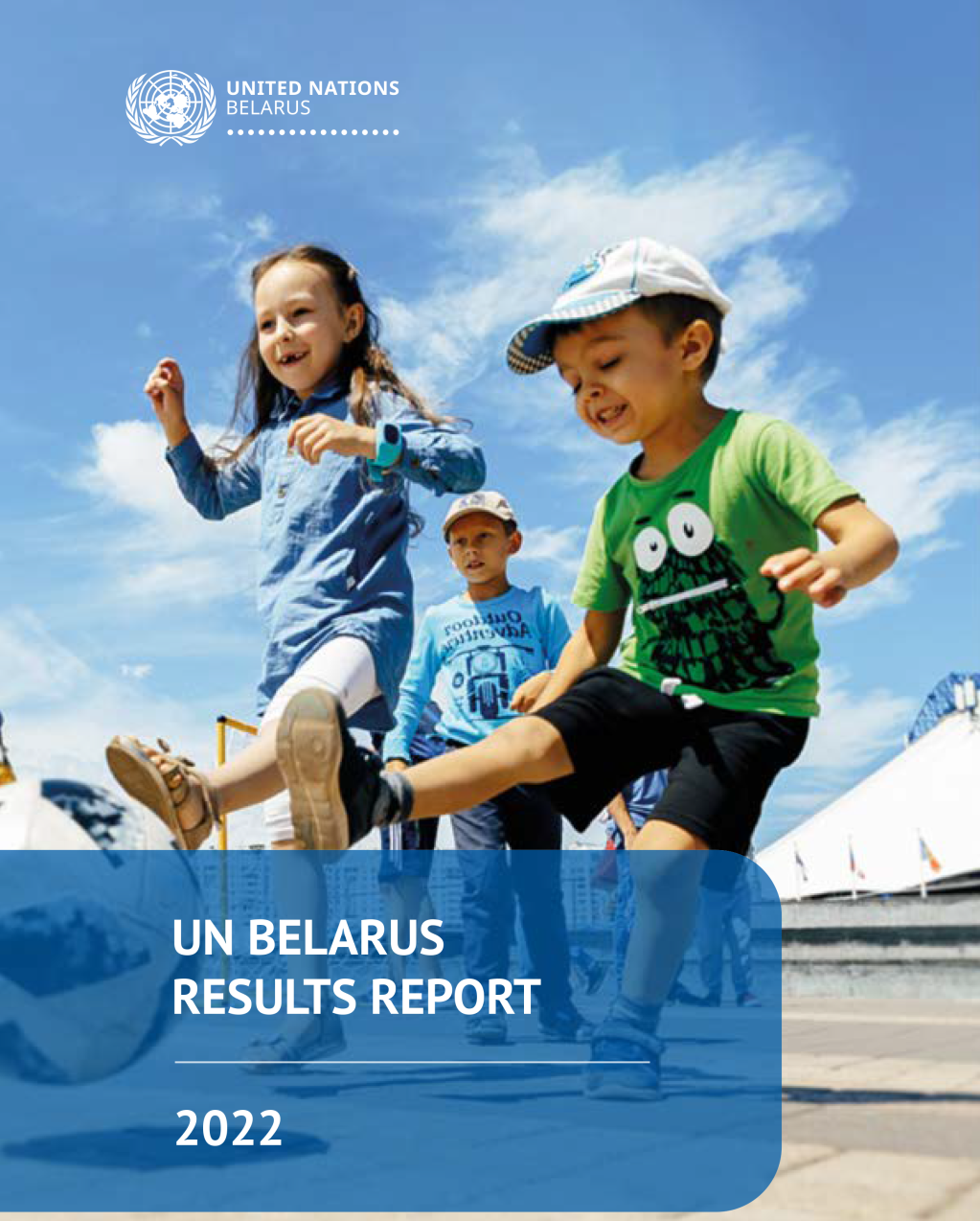
Publication
10 December 2020
Universal Declaration of Human Rights in Pictures
On December 10, 1948, the General Assembly of the United Nations approved and proclaimed the Universal Declaration of Human Rights, the full text of which is reproduced on these pages. Taking this decision of historic significance, the Assembly appealed to all member states of the Organization to promulgate the text of the Declaration and to do everything possible to “disseminate, promulgate and explain it, mainly in schools and other educational institutions, without distinction based on the political status of countries or territories ".
1 of 3
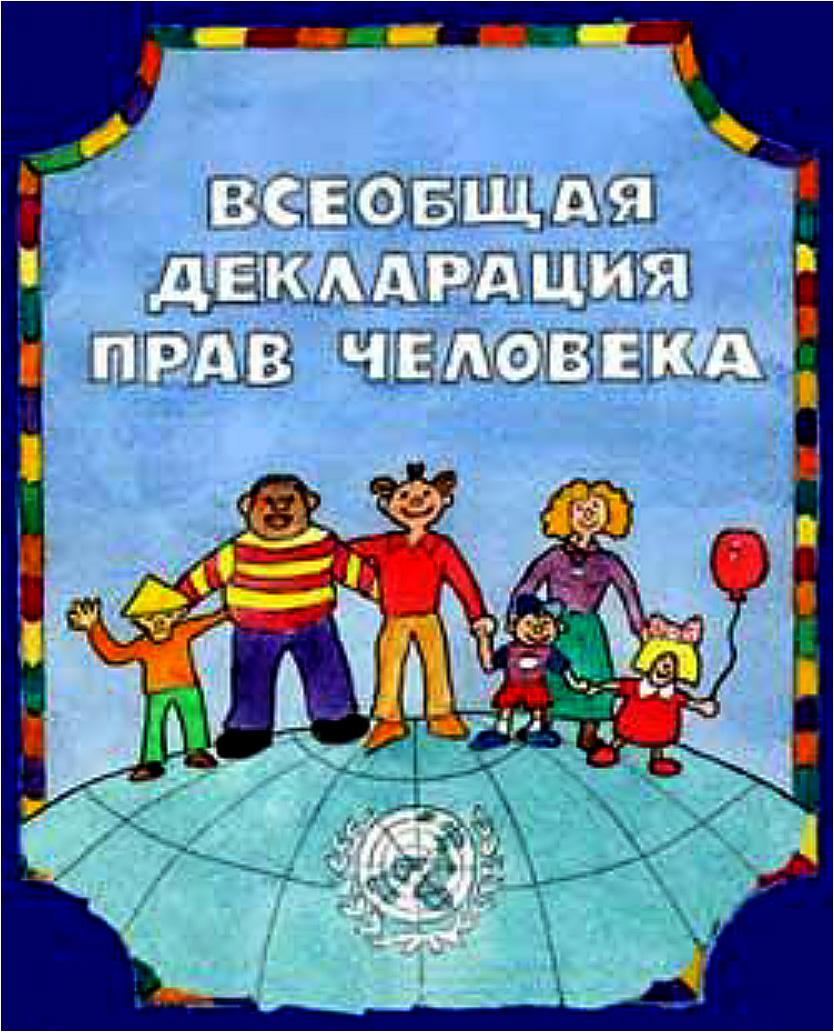
Publication
09 February 2021
Universal Declaration of Human Rights in Belarusian
December 10, 2018 marked the 70th anniversary of the adoption of the Universal Declaration of Human Rights (UDHR), which for the first time in the world affirmed the equal and inalienable rights of everyone.
In commemoration of the anniversary of the Declaration, at the initiative of the United Nations in Belarus, for the first time in many years, the Universal Declaration of Human Rights was published in the Belarusian language. The text of the Universal Declaration of Human Rights in Belarusian was clarified by the Center for the Study of Belarusian Culture, Language and Literature of the National Academy of Sciences of Belarus.
1 of 3
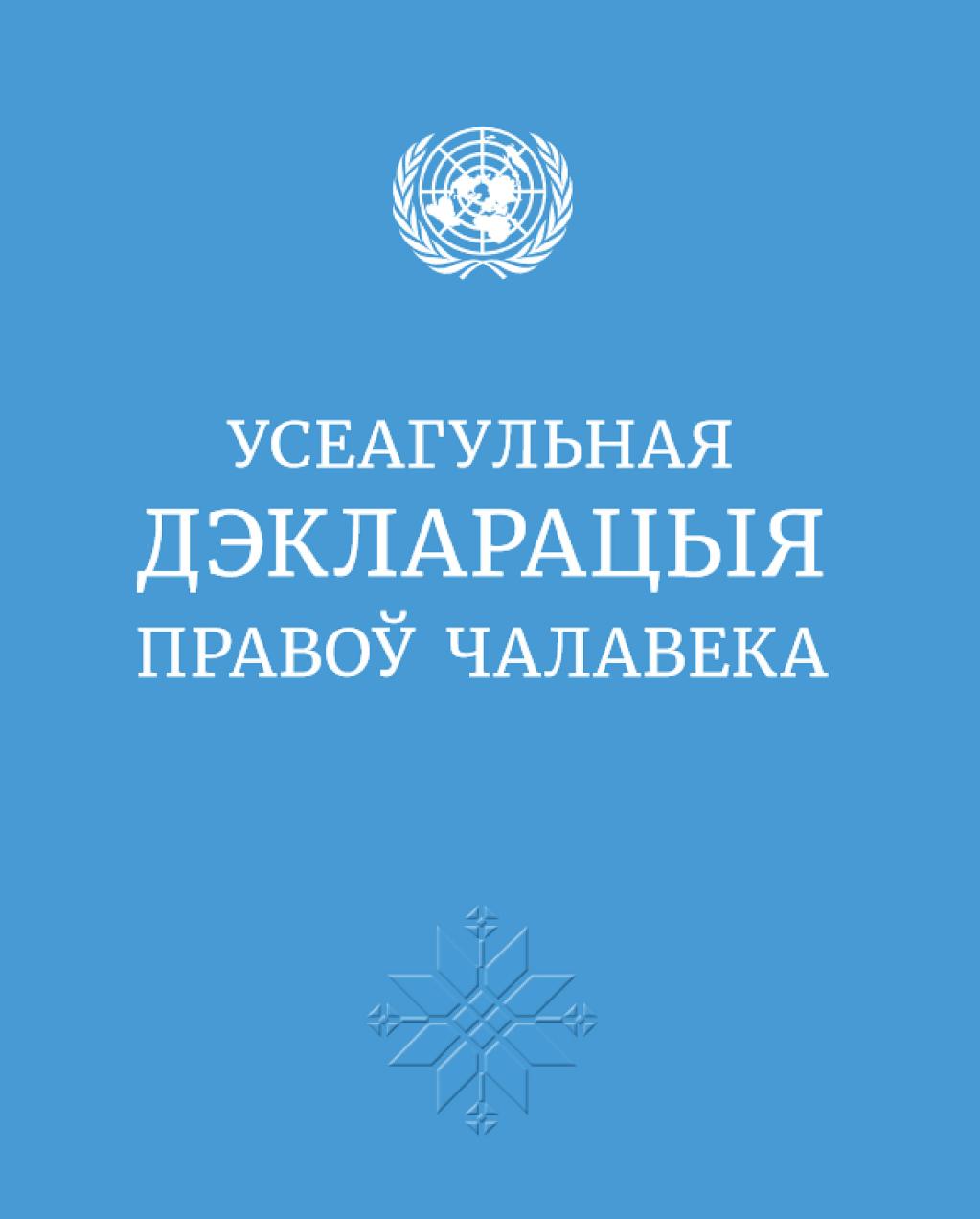
Story
22 July 2025
Accelerating the Transition to Clean Energy: A Global Call and Dialogue with Business in Belarus
A Global Call and Accelerated Transition to Clean EnergyOn 22 July 2025, António Guterres, the Secretary-General of the United Nations, delivered a global address at the UN Headquarters titled “A Moment of Opportunity: Supercharging the Clean Energy Age”. In his speech, he stated: “Fossil fuels are running out of road . The sun is rising on a clean energy age.” The UN Secretary-General also explained why the energy transition from fossil fuels to renewable energy sources is unstoppable and outlined the vast benefits it will bring to people and economies. The UN Secretary-General emphasized that clean energy is already the most accessible and economically advantageous option today, with investments in this sector reaching record levels. He noted that abandoning fossil fuels is not only an ecological necessity but also the greatest economic opportunity of the 21st century. The global clean energy boom confirms this: in 2023 alone, clean energy sectors drove 10% of global GDP growth, and clean energy sector jobs (employing almost 35 million people worldwide) now outnumber fossil fuel jobs. The transition to renewable energy, Mr. Guterres stressed, will ensure energy security and reduce dependence on geopolitically unstable fuel markets. However, simply scaling up green capacity is not enough to realize these benefits. It is necessary to modernize energy grids, increase investments in energy storage systems, and strengthen cooperation among states, businesses, and technology leaders.The Secretary-General’s address coincided with the publication of a new report, prepared with the support of UN agencies and partners. The report highlights progress made since the Paris Agreement and the benefits of accelerating a just energy transition. Renewable energy sources have nearly matched fossil fuels in total installed capacity and provide about a third of all electricity worldwide, with almost all new power capacities commissioned in 2024 coming from clean energy.Belarus: Business on the Path to Clean EnergyIn the Republic of Belarus, the topic of clean energy is gaining increasing relevance.On 22 July 2025, the Office of the UN Resident Coordinator, in partnership with the UN Global Compact Network in Belarus, organized a special event to discuss the role of business in supporting and accelerating the transition to sustainable energy. This open dialogue on the UN platform for climate action included discussions on sustainable business practices in Belarus, a live broadcast of the UN Secretary-General’s speech, and an interactive Q&A session. Representatives of responsible Belarusian businesses—companies participating in the UN Global Compact Network and applying green practices—climate and ESG experts, as well as UN agencies’ representatives in the country, took part in the event.
Opening the meeting, UN Resident Coordinator Rasul Baghirov said:“Investments in renewable energy and energy efficiency strengthen competitiveness, attract green investments, and open access to new markets. The adoption of clean technologies stimulates innovation and helps businesses meet their climate commitments, making them more sustainable and prepared for future challenges.” The event served as a platform for exchange of experiences and presentation of best business practices in climate innovation and green investments. Executives and experts from companies operating in renewable energy, industry, and the financial sector shared their achievements and insights.A representative of JSC “Sber Bank” highlighted alarming climate change trends globally and in Belarus and described how the company assesses its carbon footprint — direct and indirect GHG emissions categorized into three Scopes (1, 2, and 3), implements “green office” practices, and embraces sustainable financing principles. The director of LLC “A-Leasing” shared experience in the application of digital financial tools and the successful issuance of social and green bonds in the country. A representative of IOOO “REMONDIS” emphasized that, despite growing global waste consumption, only about 10% of waste is recycled. The company focuses on waste recycling, sorting, and composting activities in Belarus. The Group of Companies “ProLiv” presented its environmental initiatives aimed, among other things, at reducing fuel consumption by adapting to individual driving behaviours. A1 Telecom Group announced the holding’s goal to achieve carbon neutrality by 2030 for Scope 1 and Scope 2 emissions. The company also shared information about innovative projects launched in Belarus, including the construction of two solar parks in the Gomel region. During the open discussion, participants addressed barriers to widespread adoption of green technologies in Belarus and explored possible joint solutions to accelerate the clean energy transition — from improving the regulatory framework to expanding financing access and developing necessary infrastructure.In conclusion, Rasul Baghirov emphasized:
“This is a moment we must seize — together. The energy revolution cannot be achieved by governments alone. It is driven by companies, entrepreneurs, and investors — those who think strategically, act decisively, and are unafraid to be pioneers.” The UN’s dialogue with Belarusian business representatives and the Secretary-General’s special address confirmed that the world stands on the brink of a major energy transformation driven by innovation, partnership, and responsibility to future generations. Belarus, endowed with significant renewable energy potential, can become a regional model of sustainable development and climate responsibility. Ensuring the transition to clean energy is not only the country’s contribution to global climate efforts but also the key to a thriving economy and improved quality of life for every citizen.The UN in Belarus calls on the government, businesses, international partners, and civil society to unite their efforts and seize this moment of opportunity to build a sustainable, safe, and just energy future for Belarus and the entire world. Watch the full UN Secretary-General’s address here https://webtv.un.org/Video message from Rasul Baghirov, the UN Resident Coordinator: “Belarus on the Path to a Clean Energy Era and a Sustainable Future” - https://youtu.be/bQ_LStDVK3U
Opening the meeting, UN Resident Coordinator Rasul Baghirov said:“Investments in renewable energy and energy efficiency strengthen competitiveness, attract green investments, and open access to new markets. The adoption of clean technologies stimulates innovation and helps businesses meet their climate commitments, making them more sustainable and prepared for future challenges.” The event served as a platform for exchange of experiences and presentation of best business practices in climate innovation and green investments. Executives and experts from companies operating in renewable energy, industry, and the financial sector shared their achievements and insights.A representative of JSC “Sber Bank” highlighted alarming climate change trends globally and in Belarus and described how the company assesses its carbon footprint — direct and indirect GHG emissions categorized into three Scopes (1, 2, and 3), implements “green office” practices, and embraces sustainable financing principles. The director of LLC “A-Leasing” shared experience in the application of digital financial tools and the successful issuance of social and green bonds in the country. A representative of IOOO “REMONDIS” emphasized that, despite growing global waste consumption, only about 10% of waste is recycled. The company focuses on waste recycling, sorting, and composting activities in Belarus. The Group of Companies “ProLiv” presented its environmental initiatives aimed, among other things, at reducing fuel consumption by adapting to individual driving behaviours. A1 Telecom Group announced the holding’s goal to achieve carbon neutrality by 2030 for Scope 1 and Scope 2 emissions. The company also shared information about innovative projects launched in Belarus, including the construction of two solar parks in the Gomel region. During the open discussion, participants addressed barriers to widespread adoption of green technologies in Belarus and explored possible joint solutions to accelerate the clean energy transition — from improving the regulatory framework to expanding financing access and developing necessary infrastructure.In conclusion, Rasul Baghirov emphasized:
“This is a moment we must seize — together. The energy revolution cannot be achieved by governments alone. It is driven by companies, entrepreneurs, and investors — those who think strategically, act decisively, and are unafraid to be pioneers.” The UN’s dialogue with Belarusian business representatives and the Secretary-General’s special address confirmed that the world stands on the brink of a major energy transformation driven by innovation, partnership, and responsibility to future generations. Belarus, endowed with significant renewable energy potential, can become a regional model of sustainable development and climate responsibility. Ensuring the transition to clean energy is not only the country’s contribution to global climate efforts but also the key to a thriving economy and improved quality of life for every citizen.The UN in Belarus calls on the government, businesses, international partners, and civil society to unite their efforts and seize this moment of opportunity to build a sustainable, safe, and just energy future for Belarus and the entire world. Watch the full UN Secretary-General’s address here https://webtv.un.org/Video message from Rasul Baghirov, the UN Resident Coordinator: “Belarus on the Path to a Clean Energy Era and a Sustainable Future” - https://youtu.be/bQ_LStDVK3U
1 of 5

Story
08 December 2024
Responsible Business Forum: Dialogue on the Future of Sustainable Development
The event brought together over 150 representatives of business, government agencies, and UN agencies. The business breakfast and panel discussion featured speeches by the UN Resident Coordinator in Belarus, Rasul Baghirov; Deputy Minister of Economy, Andrei Kartun; a representative of the Ministry of Foreign Affairs of Belarus; the Deputy Chairman of the Management Board of Belarusbank; and heads of the national UN Global Compact Networks from Belarus, Russia, and Azerbaijan. The UN Resident Coordinator in Belarus, Rasul Baghirov, noted the significant progress Belarus has made in implementing the Sustainable Development Agenda and highlighted the important role of business in achieving the remaining 20% of the SDGs by 2030. He welcomed the participation of the heads of the national Global Compact Networks from Belarus, Russia, and Azerbaijan in the event and emphasized the importance of exchanging experiences and best practices for ESG transformations. He noted the high potential for strengthening cooperation and interaction among responsible businesses at the regional level. By promoting the ESG agenda and implementing sustainability principles in business processes, businesses not only strengthen their competitiveness but also invest in a culture of tolerance and contribute to building a sustainable and fair society, the UN Resident Coordinator shared. Deputy Minister of Economy Andrei Kartun emphasized that ESG approaches are an integral tool for achieving sustainability in the face of global challenges. "In today's turbulent world, the corporate sector is obliged to move towards sustainable development in order to remain competitive and stable," he noted. The Deputy Minister also emphasized the importance of awareness and training for responsible business. In his opinion, the creation of national educational standards in the field of ESG can become a catalyst for change. The Ministry of Foreign Affairs of Belarus expressed interest in strengthening the role of business in the national architecture for managing the process of achieving the SDGs, emphasizing the importance of joint efforts. Forum participants actively discussed why it is important for business to become sustainable, sharing their achievements in ESG transformation during the plenary sessions. More than 10 companies from Belarus and Russia presented examples of creating sustainable products and services, which became a vivid demonstration of the possibilities of responsible business. The Responsible Business Forum showed that cooperation between business, the state, and international organizations opens up new prospects for integrating ESG principles, creating an inclusive economy, and promoting Agenda 2030 in Belarus.
1 of 5
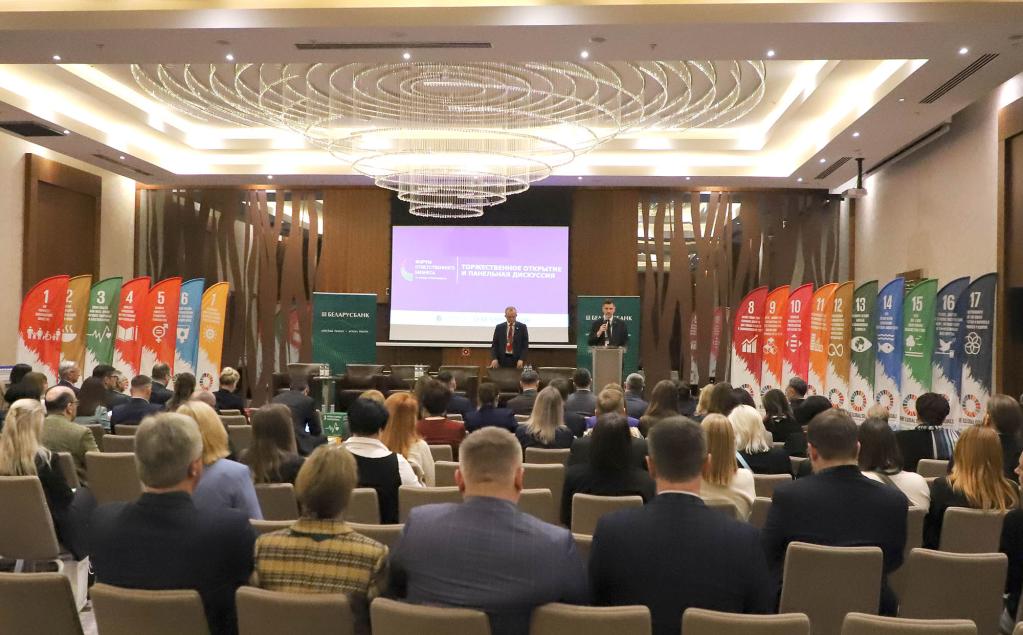
Story
09 September 2024
"World Café" in Minsk Unites Generations to Achieve the Sustainable Development Goals
On September 5, 2024, the Belarusian State Pedagogical University named after Maxim Tank became the center of a dialogue between generations aimed at defining a vision for a common future during the event "Sustainable Future," organized in the format of a "World Café." This initiative was led by the Office of the UN Resident Coordinator in the Republic of Belarus, with support from UNICEF and the UN Country Team (IOM, UNDP, UNHCR, UNFPA), as well as the Ministry of Education of the Republic of Belarus. The event attracted a diverse range of participants, including Youth Ambassadors of the Sustainable Development Goals (SDGs), representatives of the Youth Parliament, volunteers, senior citizens, and UN experts, all of whom have an active role in society. In his opening remarks, Rasul Baghirov, UN Resident Coordinator in Belarus, emphasized the importance of pluralism and dialogue: “Each of you brings your own experience, knowledge, and ideas. This diversity provides an opportunity to challenge established stereotypes and find innovative solutions, as well as to assess how similar our aspirations are.” He particularly highlighted the significance of “unity in diversity” as a foundation for fruitful cooperation. During the event, participants learned about the upcoming Summit of the Future (September 22-23, 2024) and the Pact for the Future, which served as a starting point for discussions. Participants were divided into five thematic groups, each discussing one of the key topics of the Pact: Sustainable Development and Financing for DevelopmentInternational Peace and SecurityScience, Technology, Innovation, and Digital CooperationYouth and Future GenerationsTransformation of Global Governance Rustam Haydarov, UNICEF Representative in Belarus, addressed the young participants, stating, “Today, representatives of the 'silver age' are also present here. Even if they are not as well-versed in modern technologies as young people, they can still share life experiences and become mentors. Therefore, the presence of representatives from different generations in the discussion process allows us to receive balanced proposals based on lessons learned from the past while also demonstrating unconventional views on future challenges.” The groups discussed not only their vision for the future but also specific strategies to achieve it, identifying potential drivers of change. The event marked an important stage in preparation for the upcoming Sustainable Development Council meeting (September 10, 2024), which will be held under the auspices of the National Coordinator for Achieving the SDGs. The Council will serve as a platform for discussing the country’s long-term development priorities and preparing for participation in the Summit of the Future . The outcomes of these productive discussions will be compiled into a synthesis report prepared by the UN Country Team in collaboration with the SDG Youth Ambassadors. This report will form the basis for future initiatives, including the development of a new UN Sustainable Development Cooperation Framework for 2026-2030. The Sustainable Future event exemplified cross-organizational and intergenerational collaboration, promoting greater youth engagement in decision-making processes.
1 of 5
Story
12 August 2024
If you are afraid to socialise, we offer a solution that will help you to find like–minded people
Recently, Roma was embarrassed to communicate live: it was comfortable only in the online space. Dasha was stressed because of her new environment: would she be able to find a common language with classmates and teachers after transferring to another school? Zakhar was worried about failed romantic relationships. Young people did not go into shell, but began to look for a way to cope with their worries. At first, they found like-minded people and support in Minsk Gymnasium No. 56 at the elective class “My psychological well-being and helping my peers in a crisis situation”. And then they offered their own solution to their peers on how to cope with psychological problems.The students took part in the Republican training on UPSHIFT social design and developed a project on psychological help for their peers. The training was implemented by the Institute of Psychology of the Belarusian State Pedagogical University in cooperation with the United Nations Children's Fund (UNICEF) in Belarus. The teenagers have developed the SUNLITE mobile application for their peers, which develops communication skills, helps to find like-minded people and contains useful information on how to take care of one's mental health, cope with anxiety and stress. In addition, the team is confident that the active use of their product will increase the level of emotional comfort in the gymnasium.At its core, the SUNLITE app is similar to Tinder. The difference is that in SUNLITE you need to provide more information about yourself so that the search for new acquaintances is more accurate, while communication itself takes place in messengers. The design of the application is almost complete, now its "logic" is being finalised, the search and verification of the content is underway – information of articles and cases. It is planned to launch SUNLITE for testing in mid–May, and in June it will be finalised based on the results. As soon as it is ready, a “mass” launch for gymnasium students will take place.The teenagers determined the topic of the project together and quickly, and the form of its implementation became an ambitious goal and a challenge. And although the result was a joint brainchild, each participant had their own role here: Dasha searched for and processed information, Arina drew illustrations, Tanya and Zakhar thought through the structure, compiled questionnaires, prepared a presentation, Roma wrote the code. But such features of the application as “Trouble Killer" are a team effort. They presented and defended the project together, so the victory is shared."This team immediately attracted our attention," the organisers of the UPSHIFT training say, "They are open, definitely on the same wavelength, united, prepared and deeply immersed in the topic. That is why, probably, their victory is in many ways natural." We got to know the team better. Dasha, Arina, Tanya, Roma and Zakhar have been attending the school elective class “My psychological well-being and helping my peers in a crisis situation” together for a long time and are really like-minded people; they are friends.Roma, a student of the 11th grade, plans to become a programmer and is preparing to enter the Belarusian State University of Informatics and Radioelectonics; he will be responsible for technical implementation and maintenance of SUNLITE. The topic of the project is clear and close to him, as he understands well from personal experience its relevance to life situations. “At some point, I began to feel uncomfortable in live communication. For example, it was not easy for me to even ask a passer-by where the nearest transport stop was, not to mention building relationships with my peers,” the teenager says. He considers one of the reasons for this situation to be the active digitalisation of society, as he, like most of his peers, spends a lot of time in virtual space.“And this environment is mostly impersonal, you don't see the real reactions of a person, you don't know the broader context in which communication takes place, there are more chances to get some flack in a concentrated form," Roma explains, ”Hence the shyness and fear of communicating in person, getting to know someone, and sharing your experiences and ideas out loud." And since electronic devices are a more comfortable environment for teenagers, we needed a project that would help them to use devices for good purposes, would give them useful information on the topic in an accessible form, would help them to start socialising, finding friends of interest and, perhaps, would motivate them to go offline. Roma sincerely believes that the ability to communicate allows people to avoid many problems and cope with anxiety and stress much easier. Zakhar is Roma's classmate. The future manager agrees with a friend. Moreover, he is sure that both a parent and a psychologist can help a teenager resolve his doubts, suggest the right path in a given situation; it depends on the essence of the issue and trust. “It is a mistake to think that you should approach a psychologist only with problems. You can just discuss a topic of concern. This will allow you to hear a second opinion, to see a solution that did not come to mind before. And all that has been said will stay within the office.” In addition, with understanding one's own actions comes understanding of other people's behavior and circumstances. When asked "What do his peers care about?",Zakhar jokingly replies, “There are three Horsemen of the teenage “Apocalypse”: relationships with parents, love and inability to socialise. Oh, yes, and study, probably. There are four of them then” (smiles). He approached a school psychologist himself with his worries about a failed romantic relationship. And this conversation with a specialist was the beginning of their confidential communication and the young man's more conscious interest in the subject of psychology. He began to attend the elective class and actively participate in team project work. And, of course, he made new friends here, including Arina, Dasha and Tanya schoolgirls of the 10th grade.Experts of the Republican Center for Psychological Assistance of the Belarusian State Pedagogical University together with UNICEF in Belarus launched the talk2ok.byonline platform, with the help of which teenagers and young people can receive qualified psychological assistance for free and confidentially in the form of online consultations in the format of audio and video chats, which is comfortable for modern teenagers. Peer consultants work on the platform as well. Dasha is an adept of exact sciences and a systematic approach, so collecting the necessary and useful information and case studies for the project became her task. The relevance of SUNLITE was not in doubt, because this academic year the girl was experiencing serious stress when she transferred from an ordinary school to a gymnasium. Everything is new and unfamiliar: teachers, classmates, the level of requirements, and also her own high standards of academic performance. Of course, her parents supported her at home, but at school, among her peers, anxiety and tension were increasing. As a result, grades deteriorated even in her favorite subjects, and the mood was depressed. Having realised that she could not cope on her own, and the support of her parents was not enough, Dasha approached a school psychologist, trusted and believed them. The guys from the elective class and useful information that she received at the training helped a lot. Everything gradually got better; she made friends, improved her grades, a new school day ceased to be a struggle. “It is important not to romanticise or ignore your anxiety or negative state, not to be afraid to seek help, including qualified one. This is a manifestation of caring for your mental health,” Dasha claims.Arina recently turned 16. The girl is passionate about drawing and considers this activity one of the best ways to express her feelings, worries, and dreams. This is how she worked out her stress, which was due to the fact that her classmates did not accept her immediately; it was uncomfortable and lonely at school until she came to the elective class on psychological well-being. The request was specific – to stop blaming herself for not fitting into the mainstream, and learn to praise herself for big and small victories. “A lonely, unhappy person with complexes does not live life to the fullest, they do not have energy, they project their condition onto others, therefore, relationships and health, including mental health, are always at risk,” Arina believes.”And since many adult problems are untreated childhood traumas and resentments, it is necessary to deal with them right in the moment." In her opinion, the source of resentment, anxiety, and fears may be misunderstanding with parents or peers, the attitude of a teacher, uncertainty about the future due to the difficulty of choosing a profession, inability to communicate, share or ask for help in time. “So our team's project should help teenagers overcome barriers related to communication, as well as suggest how to properly assess their condition, remind them of the importance of psychological well–being; and the tool for this is always at hand, in a mobile phone application,” Arina sums up a kind of conclusion. Tanya, you can say, is an enthusiast of psychology, as she has been interested in it for a long time and wants to connect her life with this science, so she began to attend the elective class one of the first. Outside of the gymnasium, she devotes a lot of her time to sports (she is engaged in women's football) and her family, where there are four children together with Tanya. I ask if she agrees with the opinion that most of those who want to connect their lives with psychology, first of all, want to understand themselves and their problems.Tanya nods in agreement. Then I ask a direct question, “Are you one of them?” “Yes," the girl answers honestly, "For example, I have always been empathetic, and I literally perceived someone else's pain as my own, i.e. I am physically healthy and the next moment a teammate falls unsuccessfully and breaks her leg. And I immediately react, I feel this pain, I feel bad. One more thing: professional football for 7 years affects both your personality – it becomes hardened, and your appearance – there is no time for the usual bows and makeup. You start to differ from your peers and, unfortunately, often if you are not like everyone else, then you are either in conflict with others, or you just find yourself overboard, alone.” Tanya was lucky with both her family and her teammates, so the situation in the classroom did not become traumatic, although it was unpleasant. To help herself cope with the pressure, the girl began to read books on psychology, and then signed up for the elective class. Tanya considers the first step to self-help for a teenager who is anxious, confused, scared, stressed to be an honest admission to oneself that there is a problem, and the second step is the willingness to share it with parents or a psychologist. She has taken these steps and continues to work with herself, while the head of the elective class guides and helps her. The support also comes from her teammates, with whom they created the project for UPSHIFT together.For reference.UPSHIFT is a methodology that teaches teenagers to identify, study and understand problems in local communities, and then create effective project solutions in the form of products, digital solutions or services. It also helps to develop social innovation and entrepreneurial thinking skills, including communication skills, problem solving, critical thinking, financial literacy, and budgeting. Such a program has been implemented in Belarus since 2019, and this year it was devoted to the topic of psychological well-being.
1 of 5
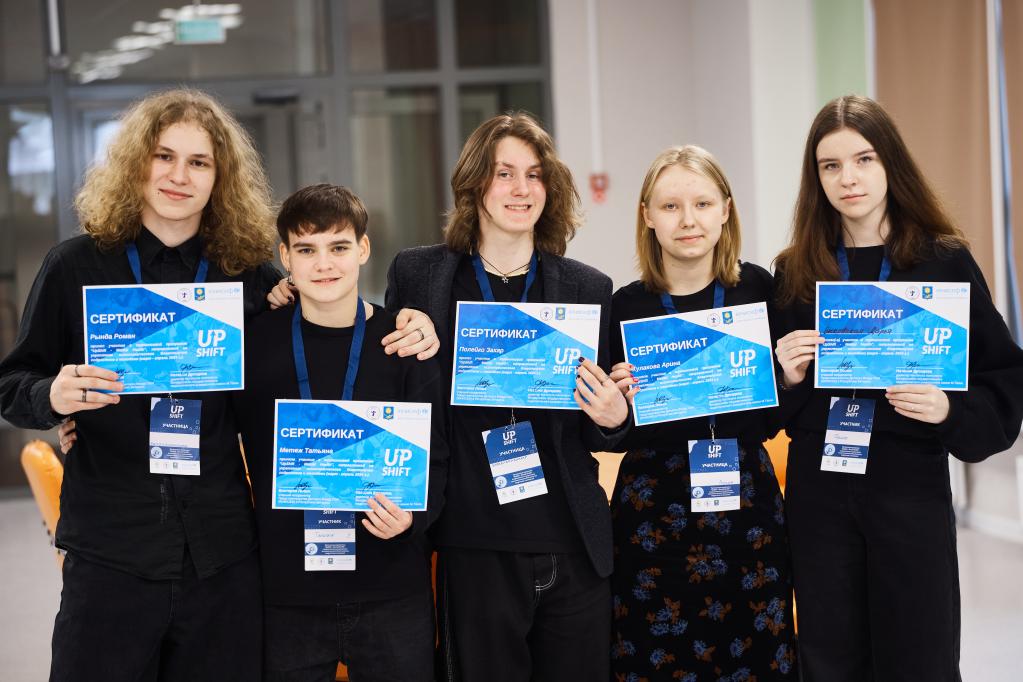
Story
23 February 2024
Results and Prospects: Overview of the Work within the Joint Project on SDGs in 2023 and Plans for 2024
In 2023, the Joint Project implemented by UN agencies in Belarus under coordination of the UN Resident Coordinator in the Republic of Belarus in partnership with the Ministry of Foreign Affairs of the Republic of Belarus and other government bodies and organizations under the general management of the National Coordinator for Achieving the SDGs and with financial support from the Russian Federation has started. The Joint Project provided four meetings of the Council for Sustainable Development, which were dedicated to the topics of education for sustainable development, integration of people with disabilities into the active life of society, progress in achieving the SDGs in the Republic of Belarus and the work of the UN system in the Republic of Belarus, with expert and technical assistance. In addition, the Project ensured the participation of representatives of government bodies of the Republic of Belarus in important international events, including the Summit on the Sustainable Development Goals and the High-Level Political Forum on Sustainable Development in New York. Among the important results of the Joint Project within the field of the work with youth is assistance to the Ministry of Education of the Republic of Belarus in holding the competition “Youth Ambassadors of the SDGs – the Future of the Planet is in Our Hands” and choosing the Youth Ambassadors of the SDGs and their Doublers of the fourth convocation. 150 young people from different regions of Belarus took part in the final of the competition. The active involvement of the younger generation in the issues of sustainable development ensures the continuity of the country’s efforts on the implementation of the 2030 Agenda and is an important area of activity within the Joint Project. One of the significant topics the Project pays attention to is active longevity. This theme was at the core of the II Republican Meeting of Silver Age Volunteers, which was held with the support of the Project and brought together more than 200 participants. It is noteworthy that over the past five years the number of silver age volunteers in Belarus has doubled. The influence of demographic factors on the socio-economic development of the country as well as the measures to prevent them were the focus of a series of seminars taking place with the participation of representatives of the Russian demographic school. More than 100 representatives of the Ministry of Labor and Social Protection, the Ministry of Economy, the Ministry of Internal Affairs, Belstat, the Academy of Sciences and the country's leading universities have increased their potential in ensuring demographic sustainability.An important aspect for achieving the SDGs is ensuring a healthy lifestyle. In this area, as part of the Project implementation in 2023, a training module on the prevention of non-communicable diseases was developed, and a series of educational videos was created to promote a healthy lifestyle. The first eight videos on healthy nutrition, physical activity, breaking bad habits and similar topics have already been published and are available for viewing via the link.In 2024, the Joint Project will continue its work in three main directions by supporting the functioning of the national institutional mechanism for managing the process of achieving the SDGs, regional development and improvement of the system for monitoring and assessing the progress towards achieving the SDGs. Thus, the Project will continue to provide support in holding meetings of the Council for Sustainable Development, which is a key element of the national institutional mechanism for managing the process of achieving the SDGs ensuring consideration of important issues of the country’s development related to the 2030 Agenda at a high level. In addition, a number of thematic events to promote the SDGs, including popularizing the ideas of sustainable development among children and youth, are planned. For instance, with the support of the Joint Project, it is planned to hold the Second Regional Forum on Sustainable Development, the International Youth SDG Forum, the republican competitions “Children about the SDGs”, “Young Friends of the SDGs”, etc. The work on dissemination of the knowledge about the SDGs will become strategic and systematic with the development of a national communication strategy to promote the SDGs in the Republic of Belarus.In the field of regional sustainable development, the work of the Joint Project will be aimed at assisting regional executive committees in developing regional strategies for sustainable development and holding the Competition of pilot initiatives on the SDGs. The Project will support the most promising local initiatives in the field of green transition to inclusive and sustainable growth, youth policy, digital transformation and social innovation, gender equality, etc.Another important component of the Joint Project is assisting statistical services in developing statistical data platforms on the SDGs and improving methods for calculating indices and indicators, such as the multidimensional poverty index. With the support of the Joint Project, it is planned to create an information center for knowledge about children and increase the capacity of Belstat employees on monitoring and assessing the progress towards achieving the SDGs.The work on the prevention of non-communicable diseases will also continue. Heads of healthcare institutions will undergo training within the framework of the developed training module. Besides, a demonstration seminar will be organized, and the most relevant topics on the prevention of non-communicable diseases and promotion of a healthy lifestyle will be covered in educational videos for the population.Additional information about the activities of the Joint Project as well as the latest news on the implementation of the 2030 Agenda in Belarus can be found on the website sdgs.by.
1 of 5
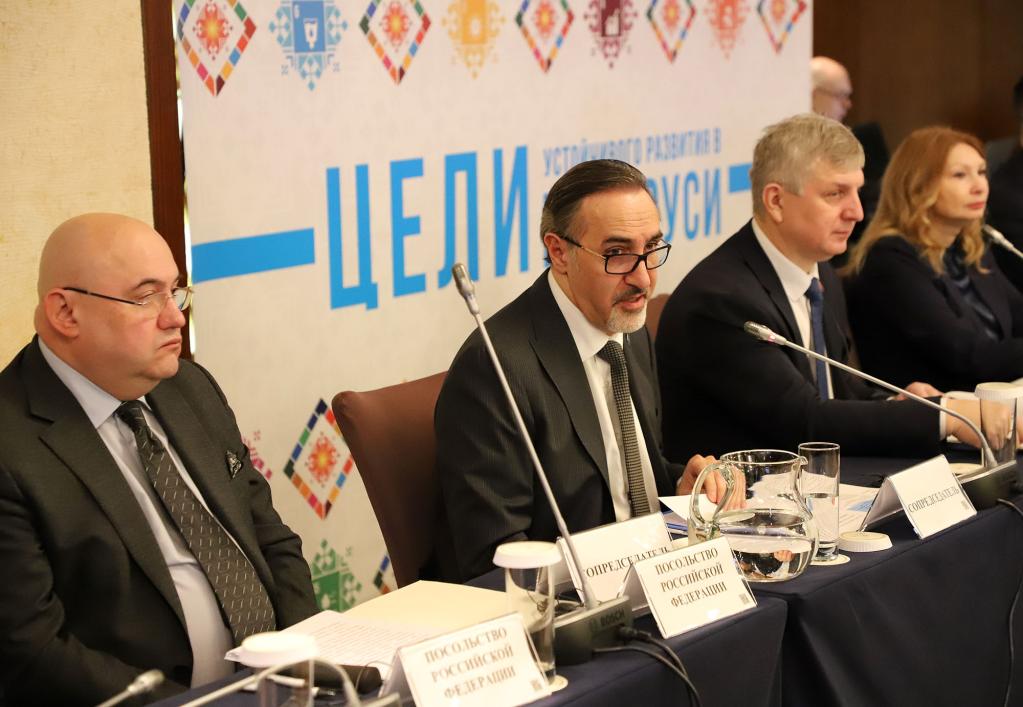
Press Release
14 August 2024
Управление ООН по снижению риска бедствий (УСРБ ООН) и Детский фонд ООН (ЮНИСЕФ) объявляют о старте международного фотоконкурса на экологическую тематику
Конкурс предоставляет молодым фотографам возможность запечатлеть важнейшие моменты борьбы с проблемами, вызванными изменением климата (например, с лесными пожарами, наводнениями, засухой, тепловыми волнами и др.) через объектив своего фотоаппарата, а также продемонстрировать способность к адаптации сообществ перед лицом стихийных бедствий. К участию приглашаются молодые люди, включая лиц с ограниченными возможностями, в возрасте от 18 до 28 лет. Таким образом организаторы конкурса стремятся усилить голоса молодежи и признать ее важную роль в документировании и реагировании на климатические изменения. 10 лучших фотографий будут выбраны для выставки в ходе Региональной платформы по снижению риска бедствий, которая состоится с 6 по 8 ноября 2024 года в Будве (Черногория), а также будут использованы в информационных материалах УСРБ ООН. Победитель голосования получит приглашение посетить Региональную платформу с оплатой проезда и проживания. Во время мероприятия он будет награжден специальной наградой. Работы участников будут оценивать представители высокого уровня агентств ООН, Европейской комиссии, Совета Европы и правительства Черногории. Фотографии будут оцениваться по следующим критериям: 1. Соответствие теме. Насколько эффективно снимок передает влияние природных катаклизмов, а также механизмы реагирования на эти вызовы. 2. Воздействие и повествование. Этот критерий оценивает эмоциональную и повествовательную силу фотографии. 3. Креативность и оригинальность. Оценивается уникальность и новаторский подход к изображению темы. 4. Техническое качество. Композиция, четкость и общее визуальное восприятие фотографии. Для участия в конкурсе необходимо отправить фотографии высокого разрешения (с минимальным разрешением 300 пикселей на дюйм) в формате JPEG или PNG на адрес vkhilkevich@unicef.org с темой письма «Photo Challenge Submission». В заявке обязательно укажите (на английском языке): · Полное имя и возраст фотографа; · Принадлежность к группе или организации (если имеется); · Место и дату фотосъемки; · Краткое описание (50-100 слов), объясняющее контекст фотографии и ее связь с темой конкурса. ВАЖНО также иметь возможность подтвердить подлинность своей работы и убедиться, что у вас есть все необходимые разрешения на использование изображений людей, если они присутствуют на фотографии. Владение фотографа английским языком приветствуется. Срок подачи заявок: все работы должны быть отправлены до 13 сентября 2024 года включительно. Объявление результатов: 10 лучших фотографий будут объявлены 13 октября 2024 года, в Международный день снижения риска бедствий. Подробнее об условиях конкурса читайте на английском языке здесь: https://efdrr.undrr.org/news/join-2024-youth-photo-challenge-disaster-risk-reduction. Присоединяйтесь к международному фотоконкурсу и внесите свой вклад в повышение осведомленности о климатических изменениях и устойчивости сообществ!
1 of 5
Press Release
26 July 2023
United Nations in Belarus hosts a meeting of the UN Resident Coordinator a.i in Belarus with the National SDG Coordinator
During the meeting the UN Resident Coordinator a.i and the National SDG Coordinator discussed preparations for the next meeting of the Council of Sustainable Development in August, where the UN will be presenting results of its work in 2022, as well as for the forthcoming 2023 SDG Summit in New York.
The UN in Belarus values Belarus’ commitment to SDGs and for incorporating SDGs in its national programme documents and the meeting of the SDG Council is a good opportunity to have an open discussion with national partners, which also helps to have a better understanding of the national needs and priorities.
“The Council of Sustainable Development has potential to be even more collaborative, if multi-stakeholder engagement is expanded, including civil society organizations, which will be also in line with SDG implementation”, said Erol Arduç.
The SDG Summit which will take place on 18-19 September in New York is aimed to serve as a wake-up call to all countries, and to remind that it is vital to keep the promise of SDGs and that acceleration is needed.
The UN Secretary-General encourages Member States to put forward commitments on national and global levels. On a national level Member States are encouraged to outline a forward-looking National Commitment to SDG Transformation at the SDG Summit.
In accordance with the SDG Index, Belarus is well-positioned, ranked 34 out of 166 countries, with almost 78 per cent progress to SDGs completed. At the same time, Belarus should be even more ambitious in its commitments to SDGs.
“The UN in Belarus is willing to support Belarus in the process of re-assessing its SDG ambitions to identify evidence based and concrete areas, where additional acceleration is needed and increased commitments are possible. This work can be interlinked with the ongoing preparation of the National Strategy for Sustainable Development until 2040”, stressed the UN Resident Coordinator a.i in Belarus during the meeting.
Joint work of the national partners and UN can highly contribute to the preparation of the National Strategy for Sustainable Development until 2040, while at the SDG Summit in September 2023, Belarus might indicate its evolving work with UN regarding SDG Transformation with the aim to present its results during the Summit of the Future (September 2024) and potential incorporation of increased SDG targets in the National Strategy for Sustainable Development until 2040.
1 of 5
Press Release
22 February 2023
New research suggests solutions to improve food security and support sustainable agriculture
Creating a world free of hunger by 2030 is at the core of the Global Agenda 2030. The SDG’s Goal 17 "End hunger, achieve food security and improved nutrition and promote sustainable agriculture" is one of the world's most pressing targets to meet.
In 2021, the UN Secretary-General António Guterres convened a global Food Systems Summit and launched bold new actions to deliver progress on all 17 SDGs, each of which touches upon on healthier, more sustainable and equitable food systems.
With the onset of the war in Ukraine, the situation continues to deteriorate, and the 2022 State of Food Security and Nutrition in the World report warned that “the world is moving in the wrong direction” on the SDG targets to end hunger, food insecurity, and all forms of malnutrition”.
Belarus occupies 55th place on the 2022 Global Food Security Index, indicating the country’s high level of food security.
To sustain the level of food security, the country needs to anticipate risks and build resilience to external economic pressures by continuously improving the sector of agriculture and food production.
The new study undertaken by UNDP in cooperation with Ministry of Agriculture and Food looks at the risks to food security and sustainable agriculture and identifies key areas for the food and agriculture industries’ enhancement. The experts come up with practical recommendations in the areas of state support, taxes, food distribution, supply chains and logistics.
On state support, the study recommends optimizing the state support and regulation in the field of agro-industrial complex, establishing clear rules for subsidizing agricultural production and applying actively the so-called green box measures for food production.
Regarding taxes, experts advocate for a tax burden reduction in agriculture.
On support to agricultural producers and SMEs the report recommends using budgetary funds on a competitive basis for partial reimbursement of the costs of agricultural organizations; financial support for SMEs; and diversify implementation of investment projects.
Experts make also recommendations on food distribution, arguing to ensure wage growth in the sector and prioritize the food needs of the vulnerable groups.
All findings of the research can contribute to improvement of the national programs of sustainable rural development for 2011–2015, agricultural business development for 2016–2020 and the Agricultural Business program for 2021–2025 - bit.ly/3xJxNDX.
The study is part of the joint UN analytical effort by United Nations Children's Fund (UNICEF), the United Nations Population Fund (UNFPA), the United Nations Development Program (UNDP), UN Women and the Office of the UN Resident Coordinator in Belarus with funding by the Joint Sustainable Development Goals (SDG) Fund.
1 of 5
Press Release
17 December 2022
Head of Belarusian Helsinki Committee Aleh Hulak dies
Oleg was one of the leading human rights experts in Belarus, specializing in the UN human rights system, treaty bodies and special procedures. For many years he cooperated closely with this Office, helping to integrate HR principles in various aspects of development cooperation. He played an active role in preparation of the national HR Action Plan, also worked with us in promoting human rights-based programming. Under his leadership, in 2022 the Belarus Helsinki Committee was granted observer status at the UN Economic and Social Council.
One could always count on his wisdom, knowledge, openness, and humor. Not everything we discussed was possible, much has changed. His life was cut way too short, but his gentle legacy will last and inspire us for long. Rest in peace, Oleg.
One could always count on his wisdom, knowledge, openness, and humor. Not everything we discussed was possible, much has changed. His life was cut way too short, but his gentle legacy will last and inspire us for long. Rest in peace, Oleg.
1 of 5
Press Release
18 November 2022
UN Resident Coordinator in Belarus took part in the National Council for Sustainable Development meeting
On 18 November the UN Resident Coordinator in Belarus addressed the meeting of the National Council for Sustainable Development. “We see that the situation in the region continues to worsen,” Joanna Kazana-Wisniowiecki said.
“This has a negative impact on the sustainable development of Belarus and creates new threats to its economy, environment, and people. It also reverses progress in many areas and affects the country’s position in terms of achievement of the Sustainable Development Goals.”
She added that last year Belarus ranked 24th in the global expert index rank of countries’ progress towards achieving the SDGs but now ranks 34th.
“In the context of this completely new reality, it is necessary to protect financing for SDGs, especially funding healthcare, education, social services as well as development of the private sector of the economy”, Joanna Kazana-Wisniowiecki emphasised.
She added that the UN Country Team is ready to complement these efforts not only through UN agencies, funds and programmes represented in Belarus, but also through its 13 non-resident agencies such as UN Women, UNODC, ITU, FAO and others that are implementing the important initiatives in the country for sustainable development.
The UN Resident Coordinator in Belarus highlighted the work of the Joint Programme on SDG Financing, implemented by UNDP, UNICEF, UNFPA and UN-Women and financed by the global Joint SDG Fund, the first results of which were presented during the meeting. According to UNDP research, Belarus continues to closely align its national programmes with the SDG targets. Monitoring and reporting of national programs’ implementation can be further enhanced, for example by systematic use of national SDG indicators developed by Belstat.
1 of 5
Latest Resources
1 / 11
Resources
28 March 2021
Resources
07 September 2020
1 / 11




















